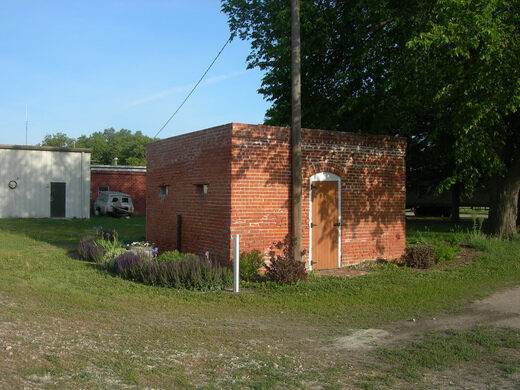The Other Harvard Makes a Bad Sale
Harvard University is located in Cambridge, Massachusetts, the twin city of neighboring Boston. About 1,570 miles west on I-90 and later I-80, though, is another Harvard: Harvard, Nebraska. It’s not very similar to the world-famous college, either, despite being named for the school. The Nebraska Harvard is home to about 1,000 people and, well, there isn’t much more to say about it.
Except for the time it accidentally sold something it shouldn’t have.
Here’s a clip from The Harvard (Nebraska) Courier from June 3, 1943, recounting the city council proceedings from May 11th over that year.

Basically: the city sold a few plots of land to a guy named Robert Pinckney for about $15, or the modern-day inflation-adjusted equivalent of $230 or so. The article, though, doesn’t tell the whole story. First, Pinckney was only 16 years old at the time. Second, the lot he spent $1.50 on — or about $23 — wasn’t vacant. Here’s a picture of the building that was on Pinckney’s newly-acquired parcel (via Atlas Obscura).

A small brick building, perhaps only large enough for one room.. A couple of small windows and an odd slit on that same wall. And not much else. It doesn’t seem like a great place to live, but that’s OK — it’s not intended to be a pleasant experience. That’s a picture of Harvard, Nebraska jail — and as of May 11, 1943, Harvard no longer owned it.
Pinckney, for his part, wasn’t trying to pull a fast one on the city council. According to a June 19, 1943 article in the Hastings (Nebraska) Daily Tribune, Pinckney claimed that “he informed the town council of the fact [that the city had accidentally listed the jail for sale] and got laughed at for [it], and that one the day of the sale he also told” the mayor and city attorney the same. But no one had seemed to care. To prove that he was right, Pinckney decided to buy the lot.
The city, by and large, ignored Pinckney’s claim of ownership and kept using the building as the town jail. Pinckney responded by trying to enforce his rights, hiring a lawyer to sue the city for rent. Per Amusing Planet, “the city agreed but moved that Robert would have to raise his sidewalks, trim trees, and cut weeds or they would take action and charge costs to the property. [The rent Pinckney demanded wouldn’t cover those costs.] At one point Pinckney threatened to tear down the jail.” The city tried to skirt the issue by offering to buy back the property for $40, but Pinckney demanded $60. The two were at an impasse — and then something stupid happened. As Atlas Obscura explains, “Time magazine and other news outlets got wind of Pinckney’s story, [turning] Harvard’s mistake [into] national news. Pinckney offered to sell the jail back, but he was too young: the law said he couldn’t deed the property to anyone until he was 21 years old.”
With Pinckney unable to sell the property back, and the city not very happy with the idea of paying him rent, the two parties needed a new solution. And it appears that there was a workaround: a fundraiser. Per History Nebraska, “Pinckney put the jail up for auction at a West Coast war bond drive. Charlie McCarthy, ventriloquist Edgar Bergen’s puppet [yes, the puppet], ‘bought’ the jail for $10,000 in war bonds and deeded it back to Harvard.” And Pinckney got a ton of publicity, which was what he was truly after — he was moving to Hollywood, hoping to break into a career in PR. Despite the jail sale’s comical beginnings, the result was a great outcome for all involved.
Harvard no longer uses the jailhouse, but it’s still there, with a sign marking the accidental sale to Pinckney. It was refurbished in or around 2009, at a price higher than $1.50.
Bonus fact: When the United States outlawed the sale of alcohol (the period known as Prohibition), some thought crime would go away with it; one church leader famously stated that “the slums will soon be a memory. We will turn our prisons into factories and our jails into storehouses and corn cribs.” And per some reports, some towns took that suggestion literally — as Professor David J. Hanson of the SUNY Potsdam sociology department states, “many people thought that alcohol was the cause of crime” and as a result, “some towns sold their jails.” (Intentionally.)
From the Archives: The Man Who Liked Himself So Much, He Went to Jail: Maybe “Liked” should be in quotes.
